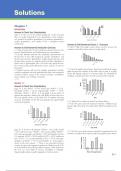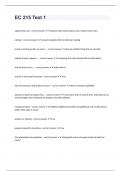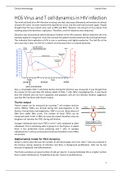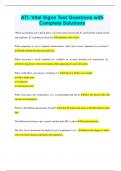Knowledge in Organisations
MAN-BCU322A, Bachelor Bedrijfskunde Year 3, Period 2
Inhoudsopgave
Week 1.......................................................................................................................................................... 2
Lecture 1...............................................................................................................................................................2
Lecture 2...............................................................................................................................................................4
Article: ‘Knowing What You Don’t Know? Discourses and Contradictions in Knowledge Management
Research’............................................................................................................................................................11
Week 2........................................................................................................................................................ 16
Lecture 3.............................................................................................................................................................16
Lecture 4.............................................................................................................................................................21
Week 3........................................................................................................................................................ 25
Workgroup 1.......................................................................................................................................................25
Lecture 5.............................................................................................................................................................25
Lecture 6.............................................................................................................................................................26
Week 4........................................................................................................................................................ 29
Workgroup 2.......................................................................................................................................................29
Lecture 7.............................................................................................................................................................30
Lecture 8.............................................................................................................................................................33
Week 5........................................................................................................................................................ 37
Workgroup 3.......................................................................................................................................................37
Lecture 9.............................................................................................................................................................37
Lecture 10...........................................................................................................................................................40
Week 6........................................................................................................................................................ 47
Workgroup 4.......................................................................................................................................................47
Week 7........................................................................................................................................................ 48
Lecture 11...........................................................................................................................................................48
Appendix..................................................................................................................................................... 52
Workgroup assignment 1...................................................................................................................................52
Workgroup assignment 2...................................................................................................................................56
Workgroup assignment 3...................................................................................................................................59
Workgroup assignment 4...................................................................................................................................62
1
,Week 1
Lecture 1
What is ‘knowledge’?
3 problems with concept of ‘knowledge’:
1. Ontologically / epistemologically incoherent (not everyone has the same idea on
what knowledge is).
2. Vague: ‘knowledge is everything and everything is knowledge’. While we work, we
use and create knowledge.
3. Not neutral, not even always functional. We often think that we agree on knowledge,
but it depends on who is defining it/using it.
What is ‘management’?
Knowledge management = bit ‘common sense’? designing, coordination, controlling of work
processes. Normative control, community (shared values/norms/ideas), protocols, manuals,
access to information, data repositories.
The more emphasize on ‘management’, the less it is about ‘knowledge’.
The more emphasize on ‘knowledge’ , the less ‘management’ matters.
Epistemology dimension
How knowledge is defined is a matter of epistemology: philosophy addressing the nature of
knowledge. ‘Knowledge about knowledge’. How do we define what is true? What is regarded
as valid knowledge and why?
Dualism what is knowledge? Objective, frozen-in-time, either/or, subjective/objective,
self/other, macro-micro, binaries, mutually exclusive opposites, uni-directional, every object
has a separate identity.
OR
When is knowledge (Duality)? Both/and/as well, no clear-cut distinction, one does not exist
without the other, pragmatism, theories of practice (knowledge is constructed in the doing),
associated with emergence, cyclical causality, object is continuously shaped by
context/situated practice.
Social order dimension
Social order = continuum bounded by:
a) Sociology of regulation society tends towards ideal state of integration,
equilibrium and order consensus (trust, common interest, science\knowledge is
neutral).
b) Sociology of radical change forces of coercion, conflict and change are
continuously challenging the established social order (‘truce’ is only temporary)
dissensus (suspicion, conflict of interest, science\knowledge is political).
2
,Neo-functionalist discourse: knowledge =
asset. Objective, measurable, it can be
acquired, progressive enlightment, reduction
of uncertainty, optimal allocation of
resources.
Constructionist discourse: knowledge =
mind. Socially constructed, in the doing
(practice), shared context, generation of
understanding, coordinating mindful action
of interdependent individuals with only
partial knowledge.
Critical discourse: knowledge = power. Role
of knowledge in organizational underclass:
reformation of social order, domination, and emancipation. Marxism, labor process.
Dialogical discourse: knowledge = discipline. Deconstruction of totalizing knowledge claims,
creation of multiple knowledge, never-ending process of knowing and correcting (the self).
Objectivist perspective: typologies of knowledge
Tacit knowledge: inexpressible in a codifiable form, subjective, personal, context-specific,
difficult to share. Tacit knowledge is ‘knowledge that is nonverbalized, or even
nonverbalizable, intuitive, unarticulated’. It is in someone’s mind because they have learned
it through experience.
Explicit knowledge: codifiable, objective, impersonal, context independent, easy to share,
everything that is written down. Explicit knowledge is easy to replicate and transfer.
Critical discourse on knowledge in organizations
Dualism: there is a ‘good’ and ‘bad’, the ‘powerful group that is evil’ vs. the
‘powerless groups that are pure, innocent and helpless.
Knowledge is an object to be owned, bought, sold.
Connects political issue (labor processes)
Role of knowledge is to raise awareness of the prevailing social injustices.
Management of (tacit) knowledge is exploitation of managers (those owning capital)
to own all knowledge relevant to obtain more power and resources (e.g., money)
Critical discourse is ‘anti-management’ and aligns itself with interests of workers.
Dialogical discourse on knowledge in organizations
Interested in the role of knowledge in the exercise of power and control, yet lacks the
political agenda and moral stance (does not pick sides, hence ‘duality’)
Ongoing struggle, dynamically shifting positions (no right or wrong)
Knowledge is discipline – the disciplinary practices that shape and are shaped by
knowledge.
Power/knowledge: before something can be controlled/managed, it must first be
known.
Focus on practices such as performance appraisals, mentoring and practices of the
self, with emphasis on the normalizing thought and actions.
Aim of this discourse is to deconstruct self-evident concepts and power relations;
prevention of normalization and totalization (enough room for the marginalized.
3
, Lecture 2
The neo-functionalist discourse
What are the assumptions about knowledge that underlie knowledge management research
that fits or uses a neo-functionalist discourse?
Neo-functionalists ask “what is knowledge?”, which suggests that knowledge is perceived
as an object.
Epistemology of possession: you either have knowledge or you do not.
Dualism
➔ The world is assumed to be completely and objectively knowable. You need to strive to
know everything about the world.
➔ The world is constructed in terms of binaries or mutually exclusive opposites (e.g.,
either/or, subject/object, self/other, macro/micro, individual/group, true/false).
➔ As a consequence: neo-functionalists favor classification (put into categories/boxes, this is
the basis of AI), taxonomies.
➔ Paradoxes or contradictions are an indication that taxonomies and models need further
refinement.
The basis for commensuration (transformation of qualities into quantities, for example if
someone is working very well, you give them a grade between 0 and 10). We have different
kind of metrics to quantify things, if you take them together you can see how an organization
is doing in reaching its goals etc.
Neo-functionalist perspective: social order dimension
Social order dimension ➔what is the nature of social order as it is perceived in sociological
and organizational research? Consensus versus dissensus based on the idea of regulation
or based on the idea that the world is continuously evolving.
Hegemonic order as natural state = we can establish something as true or false, this creates
harmony.
4
MAN-BCU322A, Bachelor Bedrijfskunde Year 3, Period 2
Inhoudsopgave
Week 1.......................................................................................................................................................... 2
Lecture 1...............................................................................................................................................................2
Lecture 2...............................................................................................................................................................4
Article: ‘Knowing What You Don’t Know? Discourses and Contradictions in Knowledge Management
Research’............................................................................................................................................................11
Week 2........................................................................................................................................................ 16
Lecture 3.............................................................................................................................................................16
Lecture 4.............................................................................................................................................................21
Week 3........................................................................................................................................................ 25
Workgroup 1.......................................................................................................................................................25
Lecture 5.............................................................................................................................................................25
Lecture 6.............................................................................................................................................................26
Week 4........................................................................................................................................................ 29
Workgroup 2.......................................................................................................................................................29
Lecture 7.............................................................................................................................................................30
Lecture 8.............................................................................................................................................................33
Week 5........................................................................................................................................................ 37
Workgroup 3.......................................................................................................................................................37
Lecture 9.............................................................................................................................................................37
Lecture 10...........................................................................................................................................................40
Week 6........................................................................................................................................................ 47
Workgroup 4.......................................................................................................................................................47
Week 7........................................................................................................................................................ 48
Lecture 11...........................................................................................................................................................48
Appendix..................................................................................................................................................... 52
Workgroup assignment 1...................................................................................................................................52
Workgroup assignment 2...................................................................................................................................56
Workgroup assignment 3...................................................................................................................................59
Workgroup assignment 4...................................................................................................................................62
1
,Week 1
Lecture 1
What is ‘knowledge’?
3 problems with concept of ‘knowledge’:
1. Ontologically / epistemologically incoherent (not everyone has the same idea on
what knowledge is).
2. Vague: ‘knowledge is everything and everything is knowledge’. While we work, we
use and create knowledge.
3. Not neutral, not even always functional. We often think that we agree on knowledge,
but it depends on who is defining it/using it.
What is ‘management’?
Knowledge management = bit ‘common sense’? designing, coordination, controlling of work
processes. Normative control, community (shared values/norms/ideas), protocols, manuals,
access to information, data repositories.
The more emphasize on ‘management’, the less it is about ‘knowledge’.
The more emphasize on ‘knowledge’ , the less ‘management’ matters.
Epistemology dimension
How knowledge is defined is a matter of epistemology: philosophy addressing the nature of
knowledge. ‘Knowledge about knowledge’. How do we define what is true? What is regarded
as valid knowledge and why?
Dualism what is knowledge? Objective, frozen-in-time, either/or, subjective/objective,
self/other, macro-micro, binaries, mutually exclusive opposites, uni-directional, every object
has a separate identity.
OR
When is knowledge (Duality)? Both/and/as well, no clear-cut distinction, one does not exist
without the other, pragmatism, theories of practice (knowledge is constructed in the doing),
associated with emergence, cyclical causality, object is continuously shaped by
context/situated practice.
Social order dimension
Social order = continuum bounded by:
a) Sociology of regulation society tends towards ideal state of integration,
equilibrium and order consensus (trust, common interest, science\knowledge is
neutral).
b) Sociology of radical change forces of coercion, conflict and change are
continuously challenging the established social order (‘truce’ is only temporary)
dissensus (suspicion, conflict of interest, science\knowledge is political).
2
,Neo-functionalist discourse: knowledge =
asset. Objective, measurable, it can be
acquired, progressive enlightment, reduction
of uncertainty, optimal allocation of
resources.
Constructionist discourse: knowledge =
mind. Socially constructed, in the doing
(practice), shared context, generation of
understanding, coordinating mindful action
of interdependent individuals with only
partial knowledge.
Critical discourse: knowledge = power. Role
of knowledge in organizational underclass:
reformation of social order, domination, and emancipation. Marxism, labor process.
Dialogical discourse: knowledge = discipline. Deconstruction of totalizing knowledge claims,
creation of multiple knowledge, never-ending process of knowing and correcting (the self).
Objectivist perspective: typologies of knowledge
Tacit knowledge: inexpressible in a codifiable form, subjective, personal, context-specific,
difficult to share. Tacit knowledge is ‘knowledge that is nonverbalized, or even
nonverbalizable, intuitive, unarticulated’. It is in someone’s mind because they have learned
it through experience.
Explicit knowledge: codifiable, objective, impersonal, context independent, easy to share,
everything that is written down. Explicit knowledge is easy to replicate and transfer.
Critical discourse on knowledge in organizations
Dualism: there is a ‘good’ and ‘bad’, the ‘powerful group that is evil’ vs. the
‘powerless groups that are pure, innocent and helpless.
Knowledge is an object to be owned, bought, sold.
Connects political issue (labor processes)
Role of knowledge is to raise awareness of the prevailing social injustices.
Management of (tacit) knowledge is exploitation of managers (those owning capital)
to own all knowledge relevant to obtain more power and resources (e.g., money)
Critical discourse is ‘anti-management’ and aligns itself with interests of workers.
Dialogical discourse on knowledge in organizations
Interested in the role of knowledge in the exercise of power and control, yet lacks the
political agenda and moral stance (does not pick sides, hence ‘duality’)
Ongoing struggle, dynamically shifting positions (no right or wrong)
Knowledge is discipline – the disciplinary practices that shape and are shaped by
knowledge.
Power/knowledge: before something can be controlled/managed, it must first be
known.
Focus on practices such as performance appraisals, mentoring and practices of the
self, with emphasis on the normalizing thought and actions.
Aim of this discourse is to deconstruct self-evident concepts and power relations;
prevention of normalization and totalization (enough room for the marginalized.
3
, Lecture 2
The neo-functionalist discourse
What are the assumptions about knowledge that underlie knowledge management research
that fits or uses a neo-functionalist discourse?
Neo-functionalists ask “what is knowledge?”, which suggests that knowledge is perceived
as an object.
Epistemology of possession: you either have knowledge or you do not.
Dualism
➔ The world is assumed to be completely and objectively knowable. You need to strive to
know everything about the world.
➔ The world is constructed in terms of binaries or mutually exclusive opposites (e.g.,
either/or, subject/object, self/other, macro/micro, individual/group, true/false).
➔ As a consequence: neo-functionalists favor classification (put into categories/boxes, this is
the basis of AI), taxonomies.
➔ Paradoxes or contradictions are an indication that taxonomies and models need further
refinement.
The basis for commensuration (transformation of qualities into quantities, for example if
someone is working very well, you give them a grade between 0 and 10). We have different
kind of metrics to quantify things, if you take them together you can see how an organization
is doing in reaching its goals etc.
Neo-functionalist perspective: social order dimension
Social order dimension ➔what is the nature of social order as it is perceived in sociological
and organizational research? Consensus versus dissensus based on the idea of regulation
or based on the idea that the world is continuously evolving.
Hegemonic order as natural state = we can establish something as true or false, this creates
harmony.
4





